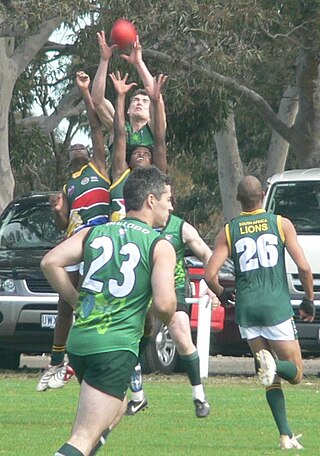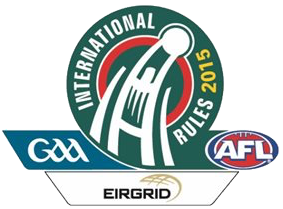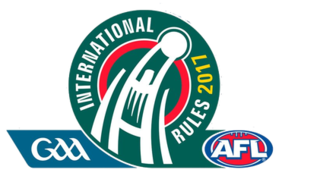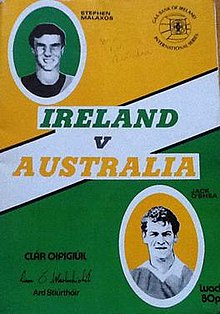
Gaelic football, commonly known as simply Gaelic, GAA, or football, is an Irish team sport. A form of football, it is played between two teams of 15 players on a rectangular grass pitch. The objective of the sport is to score by kicking or punching the ball into the other team's goal or between two upright posts above the goal and over a crossbar 2.5 metres above the ground.

The Gaelic Athletic Association is an Irish international amateur sporting and cultural organisation, focused primarily on promoting indigenous Gaelic games and pastimes, which include the traditional Irish sports of hurling, camogie, Gaelic football, Gaelic handball, and rounders. The association also promotes Irish music and dance, as well as the Irish language and it also promotes environmental stewardship through its Green Clubs initiative.

International rules football is a team sport consisting of a hybrid of football codes, which was developed to facilitate international representative matches between Australian rules football players and Gaelic football players.

In Ireland, Australian rules football began in 1999 when clubs were simultaneously formed in Dublin and Belfast, however awareness of it dates back to the 20th century due to similarities with Gaelic football and hyrbid matches played between Irish and Australian teams. It has subsequently becoming a source of players for professional leagues in Australia, particularly the Australian Football League (AFL) and later the AFL Women's (AFLW) through the Irish Experiment which is ongoing. It attracts a television audience, particularly the AFLW competition through TG4. There are two governing bodies, AFL Ireland and AFL Northern Ireland, with teams and competitions in Belfast, Cork, Dublin, Galway and Killarney. The game in Ireland is typically played in a modified 9-a-side footy format on rectangular fields.
The Australia women's international rules football team was organised by Women's Football Australia and represented Australia in the 2006 Ladies' International Rules Series against Ireland. As of 2019, this is the only series the team has played. Ireland won the series, winning the first test at Breffni Park by 134–15 and the second test at Parnell Park by 39–18.
The 2006 International Rules Series was the 13th annual International Rules Series and was played between Ireland and Australia.
The International Rules Series is a senior men's international rules football competition between the Australia international rules football team and the Ireland international rules football team. International rules football is played using a set of compromise rules devised by both governing bodies. While the International Rules Series matches use some rules from Australian rules football, the field, ball and uniforms of both teams are derived from Gaelic football.
Composite rules shinty–hurling – sometimes known simply as shinty–hurling – is a hybrid sport of shinty and hurling which was developed to facilitate international matches between the two sports.
The 1990 International Rules Series was the fourth series between Australian rules footballers from Australia and Gaelic footballers from Ireland. The series took place in Australia and consisted of three test matches between the Australian and Irish international rules football teams. Ireland won the series by 2–1 and by 24 points over the three test matches.
The 2009 International Rules Series was to have been the 15th International Rules Series football competition.
The 1987 International Rules Series was the third series between Gaelic footballers from Ireland and Australian rules footballers from Australia. The series took place in Ireland and consisted of three test matches between the Australian and Irish international rules football teams. Australia won the series 2–1 and by 27 over the three test matches.
The 1986 International Rules Series was the second series between Australian rules footballers from Australia and Gaelic footballers from Ireland. The series took place in Australia and consisted of three test matches between the Australian and Irish international rules football teams. Ireland won the series 2–1 and by 32 points over the three test matches.
The 2010 International Rules Series was the 15th International Rules Series, contested between Gaelic football players from Ireland and Australian rules football players from Australia. The Series was won by Australia, winning the first test by seven points and the second test by three, thereby winning with an aggregate score of 102 to 92. This was the first time Australia have won the Cormac McAnallen Cup since 2006. Dane Swan was awarded the Jim Stynes Medal, for being Australia best player over the Series, while Colm Begley won the equivalent award for Ireland. The second test in Croke Park on 30 October marked the end of the broadcasting career of commentator Micheál Ó Muircheartaigh who commentated on his last live match on RTÉ Radio.
The 2011 International Rules Series was the 16th International Rules Series contested between Gaelic footballers from Ireland and Australian rules footballers from Australia. The series was played over two test matches, with Ireland winning the series by 130-65 points on aggregate. In doing so, Ireland achieved its best winning test margin and greatest ever series victory, whilst Australia had its lowest ever test score in the second test. The Australian Football League (AFL) announced part of the schedule for the series in June 2011, with the Etihad Stadium in Melbourne chosen for the first test match. In July, the AFL announced that Metricon Stadium on the Gold Coast would be the venue for the second test. This was the first time that any stadium in the state of Queensland hosted an international rules game. The first test was played on 28 October with the second test played a week later on 4 November.

A comparison of Gaelic football and rugby union is possible because of certain similarities between the codes, as well as the numerous dissimilarities.
The 2013 International Rules Series was the 17th International Rules Series contested between Gaelic footballers from Ireland and Australian footballers from Australia. Ireland entered the 2013 series as defending champions, whilst Australia were, for the first time in the series, represented by an exclusively Indigenous team, known as the Indigenous All-Stars.

The 2014 International Rules Series was contested between Gaelic footballers from Ireland and Australian footballers from Australia. The 18th series of international rules football since the concept's inception in 1984, Ireland entered as defending champions, with Australia seeking their first series win since 2010. The match was played at Perth's Patersons Stadium on Saturday 22 November.

The 2015 International Rules Series was contested between Gaelic footballers from Ireland and Australian footballers from Australia. The 19th series of International rules football since the concept's inception in 1984, Australia entered the test as defending champions, following their 10-point victory in the solitary test match in 2014. The match was played at Croke Park, the headquarters of the Gaelic Athletic Association, on Saturday, 21 November.

The 2017 International Rules Series was the 20th International Rules Series contested by Gaelic footballers from Ireland and Australian footballers from Australia. The series was hosted by Australia and was the first in four years to revert to an aggregate points format. The two test matches were played on 12 and 18 November 2017 at the Adelaide Oval and Domain Stadium.









